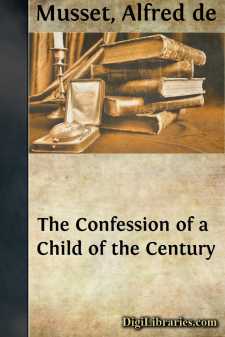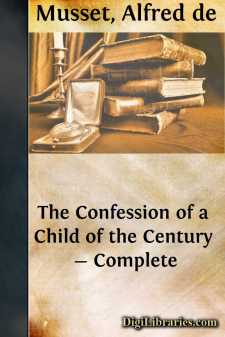Categories
- Antiques & Collectibles 13
- Architecture 36
- Art 48
- Bibles 22
- Biography & Autobiography 813
- Body, Mind & Spirit 142
- Business & Economics 28
- Children's Books 15
- Children's Fiction 12
- Computers 4
- Cooking 94
- Crafts & Hobbies 4
- Drama 346
- Education 46
- Family & Relationships 57
- Fiction 11828
- Games 19
- Gardening 17
- Health & Fitness 34
- History 1377
- House & Home 1
- Humor 147
- Juvenile Fiction 1873
- Juvenile Nonfiction 202
- Language Arts & Disciplines 88
- Law 16
- Literary Collections 686
- Literary Criticism 179
- Mathematics 13
- Medical 41
- Music 40
- Nature 179
- Non-Classifiable 1768
- Performing Arts 7
- Periodicals 1453
- Philosophy 64
- Photography 2
- Poetry 896
- Political Science 203
- Psychology 42
- Reference 154
- Religion 513
- Science 126
- Self-Help 84
- Social Science 81
- Sports & Recreation 34
- Study Aids 3
- Technology & Engineering 59
- Transportation 23
- Travel 463
- True Crime 29
Alfred de Musset
Alfred de Musset (1810–1857) was a French Romantic poet, playwright, and novelist, known for his exploration of human emotions, love, and melancholy. His notable works include "Confessions of a Child of the Century," which reflects his personal struggles and disillusionment, and the play "Lorenzaccio," considered one of his masterpieces. Musset's tumultuous love affair with novelist George Sand heavily influenced his writing, contributing to the emotional depth of his works. He was also elected to the prestigious Académie française in 1852 for his literary contributions.
Author's Books:
Sort by:
by:
Alfred de Musset
CHAPTER I THE life must be lived before the history of a life can be written, hence it is not my life that I am writing. Having been attacked in early youth by an abominable moral malady, I relate what has happened to me during three years. If I were the only victim of this disease, I would say nothing, but as there are many others who suffer from the same evil, I write for them, although I am not sure...
more...
by:
Alfred de Musset
ALFRED DE MUSSET A poet has no right to play fast and loose with his genius. It does not belong to him, it belongs to the Almighty; it belongs to the world and to a coming generation. At thirty De Musset was already an old man, seeking in artificial stimuli the youth that would not spring again. Coming from a literary family the zeal of his house had eaten him up; his passion had burned itself out and...
more...



